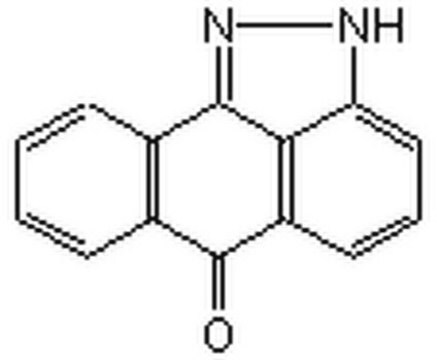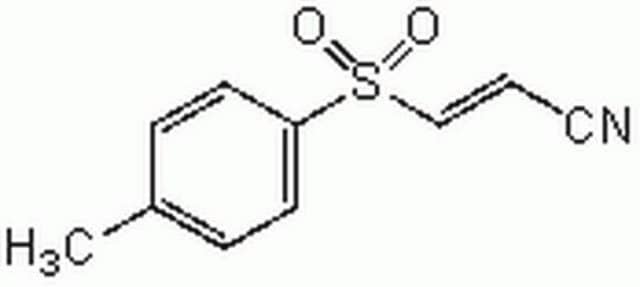559389
SB 203580
≥98% (HPLC), film (Thin), p38 MAP kinase inhibitor, Calbiochem®
Sinónimos:
SB 203580, 4-(4-Fluorophenyl)-2-(4-methylsulfinylphenyl)-5-(4-pyridyl)1H-imidazole, p38 MAP Kinase Inhibitor XVI
About This Item
Productos recomendados
product name
SB 203580, SB 203580, CAS 152121-47-6, is a highly specific, potent, cell-permeable, selective, reversible, and ATP-competitive inhibitor of p38 MAP kinase (IC₅₀ = 34 nM in vitro, 600 nM in cells).
Quality Level
assay
≥98% (HPLC)
form
film (Thin)
manufacturer/tradename
Calbiochem®
storage condition
OK to freeze
protect from light
solubility
DMSO: 30 mg/mL
shipped in
ambient
storage temp.
−20°C
InChI
1S/C21H16FN3OS/c1-27(26)18-8-4-16(5-9-18)21-24-19(14-2-6-17(22)7-3-14)20(25-21)15-10-12-23-13-11-15/h2-13H,1H3,(H,24,25)
InChI key
CDMGBJANTYXAIV-UHFFFAOYSA-N
General description
Biochem/physiol Actions
Warning
Other Notes
Powell, D.J., et al. 2003. Mol. Cell Biol.23, 7794.
Davies, S.P., et al. 2000. Biochem. J.351, 95.
Iwasaki, S., et al. 1999. J. Biol. Chem.274, 26503.
Gallagher, T.F., et al. 1997. Bioorg. Med. Chem. 5, 49.
LoGrasso, P.V., et al. 1997. Biochem. 36, 10422.
Hazzalin, C.A., et al. 1996. Curr. Biol.6, 1028.
Kramer, R.M., et al. 1996. J. Biol. Chem.271, 27723.
Saklatvala, J., et al. 1996. J. Biol. Chem. 271, 6586.
Cuenda, A., et al. 1995. FEBS Lett.364, 229.
Gallagher, T.F., et al. 1995. Bioorg. Med. Chem. Lett. 5, 1171.
Lee, J.C., et al. 1994. Nature 372, 739.
Legal Information
signalword
Warning
hcodes
Hazard Classifications
Acute Tox. 4 Oral
Storage Class
13 - Non Combustible Solids
wgk_germany
WGK 3
flash_point_f
Not applicable
flash_point_c
Not applicable
Certificados de análisis (COA)
Busque Certificados de análisis (COA) introduciendo el número de lote del producto. Los números de lote se encuentran en la etiqueta del producto después de las palabras «Lot» o «Batch»
¿Ya tiene este producto?
Encuentre la documentación para los productos que ha comprado recientemente en la Biblioteca de documentos.
Los clientes también vieron
Nuestro equipo de científicos tiene experiencia en todas las áreas de investigación: Ciencias de la vida, Ciencia de los materiales, Síntesis química, Cromatografía, Analítica y muchas otras.
Póngase en contacto con el Servicio técnico












